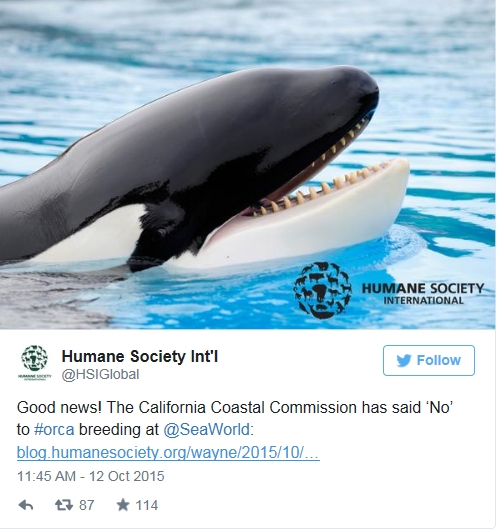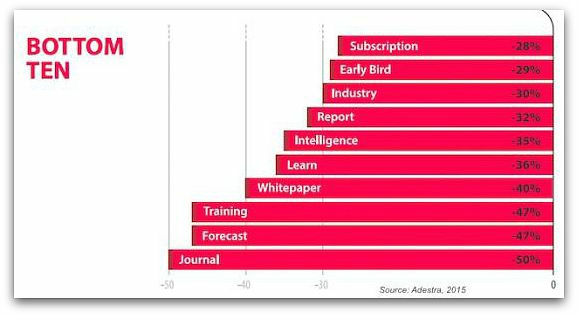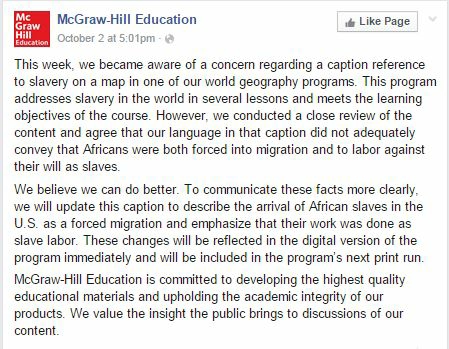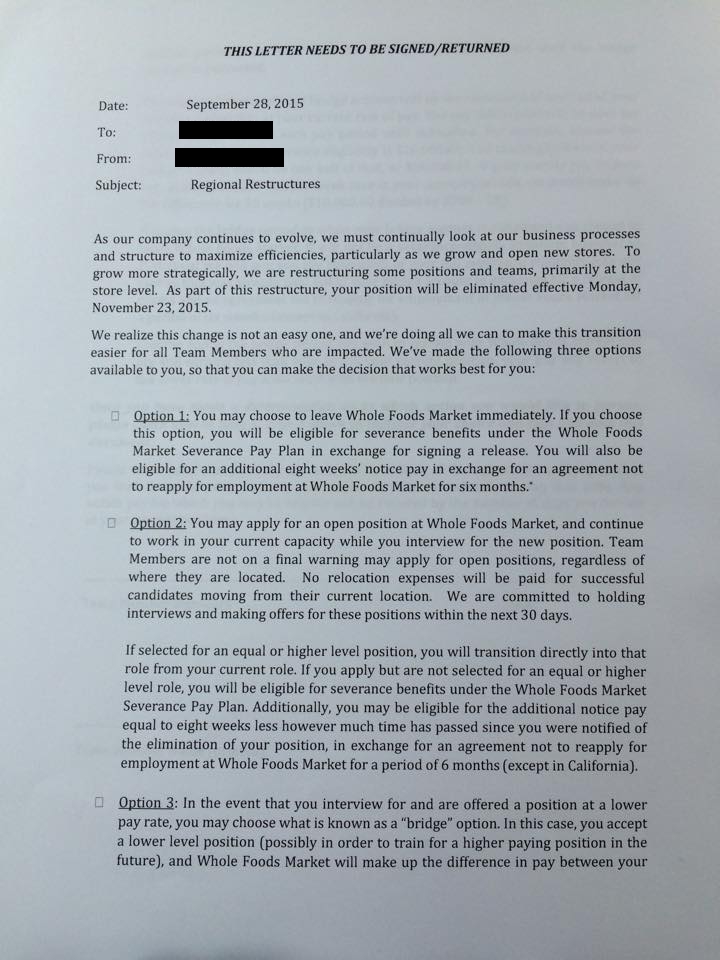Grammar May Reflect View of Slavery
 A Dartmouth faculty member analyzed grammatical choices in a history textbook and found bias in describing slavery. In a New York Times Op-Ed, Ellen Bresler Rockmore, a lecturer in the university's Institute for Writing and Rhetoric, wrote about the following excerpt in a section called "Texas United States History":
A Dartmouth faculty member analyzed grammatical choices in a history textbook and found bias in describing slavery. In a New York Times Op-Ed, Ellen Bresler Rockmore, a lecturer in the university's Institute for Writing and Rhetoric, wrote about the following excerpt in a section called "Texas United States History":
"Some slaves reported that their masters treated them kindly. To protect their investment, some slaveholders provided adequate food and clothing for their slaves. However, severe treatment was very common. Whippings, brandings, and even worse torture were all part of American slavery."
Rockmore points out that "slaves," "masters," and "slaveholders" are used as subjects in the first two sentences, which portray these actors positively. However, the next two sentences have no people as subjects. I will also say what is more obvious: the beginning of the paragraph, arguably the topic sentence, includes the positive portraying, downplaying whippings, etc.
In another section, actors are also omitted, and the sentence is written using passive voice: "Families were often broken apart when a family member was sold to another owner."
Rockmore also notes when "slaves" are subjects in sentences throughout the section of this textbook:
"After all, there are many sentences in which 'slaves' are the subjects, the main characters in their own narrative. But what are the verbs in those sentences? Are the slaves suffering? No, in the sentences that feature slaves as the subject, as the main actors in the sentence, the slaves are contributing their agricultural knowledge to the growing Southern economy; they are singing songs and telling folk tales; they are expressing themselves through art and dance.
"There are no sentences, in these excerpts, anyway, in which slaves are doing what slaves actually did: toiling relentlessly, without remuneration or reprieve, constantly subject to confinement, corporal punishment and death."
Discussion Starters:
- What's your view of Rockmore's analysis? Is she interpreting the writing well or being overly picky?
- What effect do you think this Texas textbook will have on students' understanding of slavery?
Amazon Responds to NYT Piece
 Two months after The New York Times published a scathing article about Amazon's work environment, the company is responding. Right after the article, Jeff Bezos did send an email to employees, and others wrote their own perspective. But this is an official and attacking review of the article by Jay Carney, former White House press secretary, and now VP of worldwide corporate affairs at Amazon.
Two months after The New York Times published a scathing article about Amazon's work environment, the company is responding. Right after the article, Jeff Bezos did send an email to employees, and others wrote their own perspective. But this is an official and attacking review of the article by Jay Carney, former White House press secretary, and now VP of worldwide corporate affairs at Amazon.
Reminiscent of criticism of Rolling Stone's article on rape at the University of Virginia, this piece challenges New York Times reporters' fact checking. Will The New York Times also retract its article?
Carney begins his rebuttal with the quote featured in the Times article: "Nearly every person I worked with, I saw cry at their desk." He writes,
"Olson's words were so key to the narrative the Times wished to construct that they splashed them in large type just below the headline.
"Here's what the story didn't tell you about Mr. Olson: his brief tenure at Amazon ended after an investigation revealed he had attempted to defraud vendors and conceal it by falsifying business records. When confronted with the evidence, he admitted it and resigned immediately."
It will be interesting to see how The New York Times responds to these claims.
UPDATES:
- Dean Baquet, executive editor of The New York Times responded, justifying the article. He said that more than 100 employees were interviewed, and themes emerged clearly (which, he says, have been supported by thousands of comments on the Times' website). Baquet also cites several employees and clarifies their perspective more fully.
- Carney again responded, questioning the Times' fact-checking.
Discussion Starters:
- Why did Amazon publish this article two months after The Times piece?
- How do you think The Times will respond? What could the reporter say to substantiate the article?
- UPDATE: Do Banquet's response and/or Carney's response change your opinion of the story or Amazon?
IHOP Gets Cute But Crosses a Line
Sure, companies need to attract attention, and social media is a good way to differentiate a brand. But IHOP went too far with its references to breasts, and people didn't respond well. These images and the tweet say it all.
With an edgy voice, the company is trying to reach a younger demographic, but it backfired. People responded with anger and surprise. @JuddLegum tweeted, "Something is going on with IHOP on Twitter and I hope I never find out what it is."
To the company's credit, it sent a quick, natural apology tweet:
Discussion Starters:
- It's difficult for companies to know what's just edgy and funny-and what crosses an ethical line. How would you advise companies to distinguish?
- Assess IHOP's response tweet. Does it work? Should the company have issued a longer or different apology?
United Announces Acting CEO
 United Airlines has selected a new chief while the previously selected CEO is in the hospital. United CEO Jeff Smisek resigned amidst allegations of improprieties including keeping unprofitable flights to suit an executive at the NY/NJ Port Authority. Oscar Munoz, previously COO at CSX, was hired to replace Smisek, and had a strong start, communicating with United customers and employees.
United Airlines has selected a new chief while the previously selected CEO is in the hospital. United CEO Jeff Smisek resigned amidst allegations of improprieties including keeping unprofitable flights to suit an executive at the NY/NJ Port Authority. Oscar Munoz, previously COO at CSX, was hired to replace Smisek, and had a strong start, communicating with United customers and employees.
But Munoz suffered a heart attack just 41 after his appointment and has taken a medical leave. In the interim, the company announced Brett Hart, United's general counsel, as acting CEO. Hart joined United in 2010 from Sara Lee.
In the press release posted on United's website, the company quoted Hart:
"Oscar's agenda is focused on customer service, teamwork and innovation and I, along with the executive team, will continue to move quickly to implement it. We believe strongly that we can continue to make steady progress on increasing shareholder value by working together to deliver a great product to our customers."
Although this sounds optimistic for Munoz's return, the press release ended this way:
"The board of directors remains actively engaged in preparing for all potential outcomes regarding the company's leadership structure."
Strangely, a CNN Money article includes this reference to Hart's history at Sara Lee:
"Hart was at Sara Lee when its CEO, Brenda Barnes, suffered a stroke and resigned in July 2010. Hart announced he was leaving for a position at United three months later."
Discussion Starters:
- What are United's considerations in addressing Munoz's leave and announcing an acting CEO?
- Assess United's statement about the leadership change. Read between the lines: what do you take away from the announcement?
- Why would CNN Money include Hart's history at Sara Lee?
VW Europe Apology
With more than 1.2 million of the 11 million affected cars in the UK, the managing director of Volkswagen UK has issued his own apology for the deceptive software.
Willis told members of parliament (MPs) that he is working hard to communicate with customers. He also admitted the company's failures:
"We mishandled the situation. That's why we need to fix the cars, that's why we need to get the customers in and need to put the cars right.
"We mishandled the situation without a shadow of a doubt."
When questioned about diesel emissions, Willis denied that the cars are emitting more than expected. The Guardian reports,
The Green party MP, Caroline Lucas, asked Willis: "How much more NOx has been emitted by your cars than would have been the case if your claims had not been dishonest?" Willis replied: "None." Lucas replied: "How can that be the case?"
Another MP told The Guardian, "There are a lot of unanswered questions that we would have expected to have been answered in the session."
Discussion Starters:
- Watch Willis's statement to the MPs. Assess his delivery, message, and so on.
- Compare Willis's statement to that of Martin Winterkorn and Michael Horn. What similarities and differences do you notice? To what do you attribute the differences?
Pope Apologizes for...What?
Pope Francis has issued an apology, but critics want to know what it's for. He asks for forgiveness for "the scandals that have occurred recently both in Rome and at the Vatican."
A Reuters article says the apology is "an apparent reference to two cases of priests and gay sex revealed this month during a major meeting of bishops." The article also indicates, "The pope also appeared to be referring to a scandal exposed in the Italian media last week about an order of priests who run a parish in a well-to-do neighborhood in Rome."
But for some, the apology isn't clear enough. The outreach director for the organization Survivors Network of those Abused by Priests (SNAP) expressed her frustration:
"Instead of stopping clergy sex scandals, Pope Francis is again asking forgiveness for them. That may be good public relations but it's irresponsible leadership."
This isn't the first broad apology. In 2000, John Paul II made what The Guardian called "a sweeping apology for 2,000 years of violence, persecution and blunders."
Discussion Starters:
- What's your view of the pope's apology? Is it enough?
- If the pope were to be more specific, what could he say?
Democratic Debate
Five presidential candidates participated in the Democratic Debate on CNN. Who won? Here's what some of the major U.S. newspapers reported:
- The Wall Street Journal focused on Hillary Clinton as the lead candidate: ". . . like her campaign more broadly, she seemed determined to use the opportunity to march methodically through her policy positions, to remind voters of her broad experience, and to unleash just enough criticism of Republicans to remind Democrats that they are supposed to be the real opponents."
- The New York Times complimented Clinton's performance:
"On Tuesday night, after months of political heartburn, things finally started cutting Hillary Rodham Clinton's way.
"Her performance at the first Democratic presidential debate was so commanding that even her greatest vulnerability - the lingering controversy over her private email practices as secretary of state - ended up redounding to her benefit."
- The Atlantic commented on the predictability: "Hillary Clinton delivered a typically strong performance, much as expected; Bernie Sanders played to type, railing against corporations and inequality. Martin O'Malley kept to his strategy of hitting Clinton. And Jim Webb and Lincoln Chafee remained, for the most part, marginal to what was going on."
The highlight of the night was Bernie Sanders' support for Clinton:
Discussion Starters:
- Sanders starts this segment with, "Let me say something that may not be great politics." What do you think? Did this support work for or against Sanders?
- Watch the candidates' opening statements. How did they do? What do you notice about delivery style and message strategy?
Coastal Commission Bans Whale Breeding
In what could result in the final demise of SeaWorld, the California Coastal Commission announced a ban on breeding whales. Because SeaWorld no longer captures whales from the wild (and hasn't in 35 years, according to the theme park), its source of entertaining orcas must come from breeding within the current supply.
In a press release, SeaWorld says it will "review options." President and CEO Joel Manby said, "Depriving these social animals of the natural and fundamental right to reproduce is inhumane and we do not support this condition."
The Editorial Board of the San Diego Union-Tribune scored a win for SeaWorld by questioning the legality of the Coastal Commission's ban. The article ended with this encouragement: "But SeaWorld has options, the most obvious being a court challenge. We urge it to aggressively pursue that option."
Others support the decision, including the Humane Society and PETA, which has advertised against SeaWorld's orca conditions by comparing their living conditions to a bathtub.
Discussion Starters:
- Assess the persuasive arguments in the Editorial Board's article. Which do you find most and least convincing?
- What actions should SeaWorld take now? Consider legal options and messaging.
Twitter Layoff Email
As Twitter's new CEO, Jack Dorsey is taking quick action and laying off 336 people, which is about 8% of the company. Engineers are taking the biggest hit, but other departments will be "streamlined" too. Severance and other fees will cost the company between $10 and $20 million in the short term.
In his email to staff, Dorsey writes to avoid "corporate speak," which we see more in the company's 8-K filing: "The restructuring is part of an overall plan to organize around the company's top product priorities and drive efficiencies throughout the company."
From: Jack Dorsey
To: All Employees
Date: October 13, 2015
Subject: A more focused Twitter
Team,
We are moving forward with a restructuring of our workforce so we can put our company on a stronger path to grow. Emails like this are usually riddled with corporate speak so I'm going to give it to you straight.
The team has been working around the clock to produce streamlined roadmap for Twitter, Vine, and Periscope and they are shaping up to be strong. The roadmap is focused on the experiences which will have the greatest impact. We launched the first of these experiences last week with Moments, a great beginning, and a bold peek into the future of how people will see what's going on in the world.
The roadmap is also a plan to change how we work, and what we need to do that work. Product and Engineering are going to make the most significant structural changes to reflect our plan ahead. We feel strongly that Engineering will move much faster with a smaller and nimbler team, while remaining the biggest percentage of our workforce. And the rest of the organization will be streamlined in parallel.
So we have made an extremely tough decision: we plan to part ways with up to 336 people from across the company. We are doing this with the utmost respect for each and every person. Twitter will go to great lengths to take care of each individual by providing generous exit packages and help finding a new job.
Let's take this time to express our gratitude to all of those who are leaving us. We will honor them by doing our best to serve all the people that use Twitter. We do so with a more purpose-built team, which we'll continue to build strength into over time, as we are now enabled to reinvest in our most impactful priorities.
Thank you all for your trust and understanding here. This isn't easy. But it is right. The world needs a strong Twitter, and this is another step to get there. As always, please reach out to me directly with any ideas or questions.
Jack
Not everyone is happy about Twitter's communication. An employee tweeted this:
Discussion Starters:
- Assess Dorsey's email as a bad-news message. How does it compare to other recent layoff notices?
- How do you think Twitter missed a communication with Bart Teeuwisse? Do you think everyone was informed this way? What else could explain his finding out by trying to access his account?
Horn Testifies Before House Committee
Michael Horn, President and CEO of Volkswagen Group of America, Inc., addressed the U.S. House Committee on Energy and Commerce Subcommittee on Oversight and Investigations about the company's emissions scandal.
His opening statement to the committee included his own defense. He said he was not aware of the software issue, but he did assure the committee that the company takes full responsibility.
Subcommittee members, such as Diana DeGette of Colorado, pushed Horn for more details about the deception:
"You haven't revealed how the defeat device affects the engine, why it was installed and how it was able to evade emissions tests. You haven't revealed when and how the engines equipped with this defeat device will be fixed. And you haven't told us whether that fix will affect the fuel economy or performance of the vehicles."
Other members questioned whether this was VW's only "dirty little secret" and expressed concern about widespread deception in the auto industry.
Discussion Starters:
- How convincing do you find Horn's opening statement?
- I wish he had coaching to pronounce "vehicle" more clearly. Do you have trouble understanding other words?
- Watch the full hearing. How well does Horn respond to questions? Which do you find particularly persuasive, and where does he fall short?
Words in Email Subject Lines
A study analyzed more than 3 billion emails in four industries to determine which words were most and least effective. The industries included retail & B2C, conferences & events, media & publishing, and B2B/professional services & financial.
The authors warn that the words don't guarantee success and depend on the brand, but we can draw some conclusions about the results.
PR Daily summarizes the findings and shows two relevant charts:
Overall, email subject lines that include the words "thank you" have the highest above-average engagement levels (+62 percent)-perhaps because many automated, transactional messages include this phrase, such as email receipts sent by brands after customers complete online purchases.
Subject lines that separate topics with vertical pipes (e.g., "Sale now on | New lines added | Win trip to Dubai | Share your pics with #summer2015rules") also perform significantly above average (+47 percent).
Timeliness also tends to work well in email subject lines, with words such as "bulletin" (+32 percent), breaking (+27 percent), and "order today" (+27 percent) all boosting engagement.
The second and fifth bars are "vertical pipes" described above (four and three, respectively).
- In Chapter 4, you read about catchy subject lines. How do these survey results match what you learned?
- Look at your 50 most recent emails. Which subject lines stand out to you? How many include successful words above?
- Practice writing a few subject lines with the successful words and vertical pipes.
McGraw-Hill Addresses Textbook Controversy
Under the title "Patterns of Immigration," a McGraw-Hill textbook explains that Africans came to America as "workers." In another section, the book says Europeans came as "indentured servants." A mother's video describing her son's experience and the book went viral. She shows pages from the book that list consultants, advisors, and reviewers who seem to have approved the book.
The publisher issued a statement.
McGraw-Hill President and CEO David Levin called the caption a "mistake" and wrote in a message to employees, "We are deeply sorry that the caption was written this way. While the book was reviewed by many people inside and outside the company, and was made available for public review, no one raised concerns about the caption. Yet, clearly, something went wrong, and we must and will do better."
Discussion Starters:
- What's your view of the "mistake"?
- How could the text get by so many reviewers?
- Analyze McGraw-Hill's two statements: the Facebook post and the CEO's quotation. What do you find effective, and what could be improved?
Air France Employees Angry About Layoffs
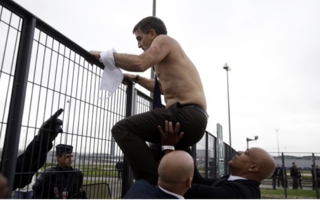 Air France announced 2,900 job cuts by 2017, and employees didn't react well. The company had asked pilots to take wage cuts, but they haven't agreed.
Air France announced 2,900 job cuts by 2017, and employees didn't react well. The company had asked pilots to take wage cuts, but they haven't agreed.
The head of HR for the company was pictured without a shirt, trying to get through a group of angry employees yelling, "A poil, à poil" (off with his clothes). In this photo, security officers are helping the executive escape. The head of Air France for Orly airport also had his shirt ripped by the crowd.
The airline union and parent company Air France-KLM denounced the employees' actions, and company officials said they would file a charges.
From IB Times, Business Insider summarizes similar employee situations in France since 2009. Employees at a Goodyear tire company held executives hostage for 30 hours rather than accept 1,173 job cuts. In 2009, employees at Caterpillar held executives hostage for a night after layoffs of 700 were announced.
Discussion Starters:
- Try to explain the employees' perspective given the news and the country's history.
- What do you think the management team will do now?
- How would such an event go over in other countries?
Layoffs at Whole Foods
Whole Foods just laid off about 1500 employees, or 1.6% of the workforce. In an interview with Fortune, Co-CEO Walter Robb explained the company's growth strategy. A statement on the company's website describes the decision as a cost-cutting measure to reduce prices and invest in technology, and Robb outlines the plan for employees:
"This is a very difficult decision, and we are committed to treating affected Team Members in a caring and respectful manner. We have offered them several options including transition pay, a generous severance, or the opportunity to apply for other jobs. In addition, we will pay these Team Members in full over the next eight weeks as they decide which option to choose. We believe this is an important step to evolve Whole Foods Market in a rapidly changing marketplace."
Critics question how "generous" the severance is but admit that it's better than other retailers' beneifts. Mother Jones describes employees as "bitter," several have leaked their layoff letter.
Discussion Starters:
- Assess the layoff letter. Consider that it's an official document that employees are asked to sign.
- How well does Robb explain the rationale for the layoffs? Read the company's statement and watch the Fortune interview to decide.
VW Still Lagging in Customer Communication
Although Volkswagen set up a hashtag on Twitter, #VWCares, the company isn't responding to many tweets. VW also set up a new website, VWDieselInfo.com, but provides no new information since Monday; the same Michael Horn video, FAQs, and Statements are listed.
The tweet replies for #VWCares sound sincere, but I see only one response since Sept. 29.
A friend sent an email to the company via the website and received, a week later, this generic reply:
The response is strange: it's asking for feedback, but I'm confident that my friend already gave sufficient information.
Discussion Starters:
- What's the company view on this? Consider how the team may be inundated with customer requests.
- Still, what can they do to address concerns? What do you think is reasonable to expect at this point?
Planned Parenthood Fights Allegations
A video showing Planned Parenthood officials discussing how they provide fetal tissue for research has caused outrage and a fight from the organization. Abortion opponents use the video as evidence of Planned Parenthood's "selling baby parts," but the organization denies these claims.
In a statement on its website, Planned Parenthood refers to opponents as "extremists" and calls the videos "highly political" with "at least 42 splices":
"They are engaged in a fraud, and the claims they've made have been discredited and disproven. If there was any truth to these videos, the footage would be shared with a judge who would take the necessary steps to seize records and conduct an investigation. Instead, the videos were shared with members of Congress in advance of being released to the public and then used in an effort to defund Planned Parenthood and eliminate access to women's health care."
The Planned Parenthood website has additional statements, and Cecile Richards appeared before Congress to testify.
Discussion Starters:
- Analyze the organization's statements on its website. What themes emerge? How would you describe the tone?
- In what ways do your own views of abortion affect how you read the organization's statements?
Sheriff's News Conference About Oregon Shooting
A shooting at Umpqua Community College in Roseburg, Oregon, has left 10 people dead and seven injured. Douglas County Sheriff John Hanlin held a news conference to discuss the situation.
Following is my take on the statement:
+ He is not polished, as you might expect from a sheriff just hours after such a shooting. He shows appropriate emotion for the situation and timing.
+ He says early on that the victims and their families are their priority.
- He could have told the public what they need to know: that the shooter is dead. (He was shot by police and then shot himself.) This might have helped assure people that they are safe. The media statement on the sheriff's website clearly states that the shooter is dead. One reason the sheriff may have avoided this is the controversy around several recent police shootings in the U.S. Otherwise, it's not clear why he wouldn't include this information.
+ Then, he could have discussed the number of casualties, which he did clearly.
- Part of the statement could have been given by the university president. That is more typical in these situations, as we saw in the Virginia Tech shooting. (See President Steger's statement.)
+ He appropriately gave contact information and a place where people are gathering.
+/- The public information officer is understandably nervous in front of the camera. He could have been more confident when telling the reporter that they weren't taking questions, and he could have simply walked away from the camera when he was finished. It's not clear why the sheriff passed this part off to him-possibly he wanted the officer to have some media exposure; although a terrible tragedy, this is a very big deal for the town.
Much publicity is surrounding President Obama's statement.
T-Mobile and Experian CEOs Address Data Breach
 A data breach at credit card processor Experian has exposed information about millions of T-Mobile customers, and the CEO is "incredibly angry" about it. Although credit card and banking account numbers weren't stolen, names, addresses, emails, and social security numbers were.
A data breach at credit card processor Experian has exposed information about millions of T-Mobile customers, and the CEO is "incredibly angry" about it. Although credit card and banking account numbers weren't stolen, names, addresses, emails, and social security numbers were.
In a "Letter to Consumers" on the company's website, John Legere wrote, "I've always said that part of being the Un-carrier means telling it like it is. Whether it's good news or bad, I'm going to be direct, transparent and honest."
Experian also published a statement on its website. In a bulleted list, the company explained what happened and then offered several FAQ's under simple headings: "About the Incident," "What Does This Mean for Me?" "I'm Still Confused," and "What We're Doing to Make It Right."
Although Legere offered two years of free credit monitoring, customers are no longer trusting the company's service. The CEO responded on Twitter: "I hear you. I am moving as fast as possible to get an alternate option in place by tomorrow."
Discussion Starters:
- Legere uses a conversational style in his Letter to Consumers. Do you consider this appropriate for the situation, unprofessional for a CEO, or something else?
- Analyze the organization of Experian's web statement. What works well, and what could be improved?
- What principles of bad-news messages from Chapter 8 do these examples follow?
GM CEO: "People Died in Our Cars"
In a statement to employees, GM CEO Mary Barra was frank: "People were hurt, and people died in our cars." Her presentation came after the company reached a $900 million settlement agreement with the Department of Justice for failing to recall cars with faulty ignition switches. (See transcript.)
Barra focused on changes at GM:
"But apologies and accountability don't amount to much if you don't change your behavior. We have. And that's what I want to focus on in our time together."
She outlined what she called a "tough agreement" and then reviewed the actions GM has already taken: "We lived our values, and it made a huge difference."
Discussion Starters:
- Who are the primary and secondary audiences for Barra's presentation? Why would the company make this internal communication public?
- Assess Barra's video. What is notable about the content, organization, and delivery compared to her previous presentation to employees?
VW Executive Changes and More Comms
 Since the scandal broke, Volkswagen has sprung in action, making executive changes and stepping up communications. No surprise, Martin Winterkorn resigned. However, his statement is unusual (as was his video, considering the likelihood that he would leave the company):
Since the scandal broke, Volkswagen has sprung in action, making executive changes and stepping up communications. No surprise, Martin Winterkorn resigned. However, his statement is unusual (as was his video, considering the likelihood that he would leave the company):
"I am shocked by the events of the past few days. Above all, I am stunned that misconduct on such a scale was possible in the Volkswagen Group.
"As CEO I accept responsibility for the irregularities that have been found in diesel engines and have therefore requested the Supervisory Board to agree on terminating my function as CEO of the Volkswagen Group. I am doing this in the interests of the company even though I am not aware of any wrong doing on my part.
"Volkswagen needs a fresh start – also in terms of personnel. I am clearing the way for this fresh start with my resignation.
"I have always been driven by my desire to serve this company, especially our customers and employees. Volkswagen has been, is and will always be my life.
"The process of clarification and transparency must continue. This is the only way to win back trust. I am convinced that the Volkswagen Group and its team will overcome this grave crisis."
Since the decision on Wednesday, VW has hired a new chief executive, Matthias Müller, previously head of Porsche. A New York Times article title calls him an "insider"-notable because of criticism about the company's centralized control of power.
Additional communications include the following:
- Statement by the executive board
- Statement by the CEO of VW car brands
- Statement about further restructuring
Discussion Starters:
- Analyze the most recent communications. Are you convinced the company is doing all it can to fix the situation and regain customer confidence?
- As far as I know, U.S. VW customers have not received any direct communication (e.g., an email) from the company. What's your view about this?








